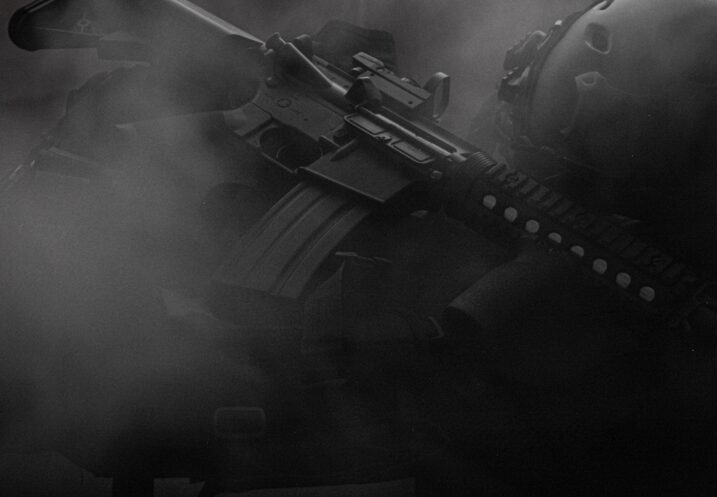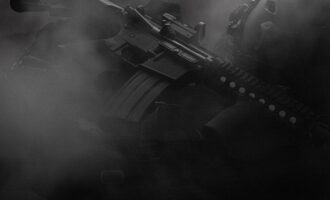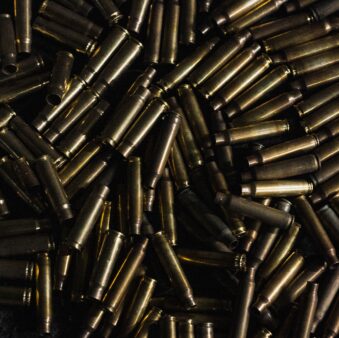
Corruption in the Global Arms Trade: An Overview
By Tanner Clegg, June 26, 2023

It is true that the United States is the world’s largest arms manufacturer and exporter—by a long shot. It is also true that the global arms trade is fundamentally and disproportionately vulnerable to corruption. When combined, these two empirical truths place a unique onus on the U.S. to get things right.
The global arms trade is worth an annual US$204 billion, and U.S. defense companies export US$162 billion-worth of arms each year. In other words, 79 percent of all international arms sales involve a U.S. company as the seller and a non-U.S. entity (often, but not necessarily, a government) as the buyer. Many of these trades are legal, pragmatic, and free from corruption. Moreover, even domestically controversial arms trades—such as the sale of U.S. armaments to Saudi Arabia, India, or the UAE—can, if conducted through the proper channels, be licit and free of immediate corruption.
But, when arms trades are characterized by corruption they are illegal, and produce profound harm. Two primary examples are bribery in procurement processes and unauthorized arms transfers, the latter of which circumvents treaties and necessarily entails corruption at borders. In addition, unscrupulous arms transfers, even if prima facie legal, can seed less proximate, downstream corruption problems in the security sectors of recipient countries and elsewhere.
These two forms of corruption depend on secrecy in the global financial system.1 Secrecy jurisdictions, opaque firms such as anonymous companies, and free trade zones (FTZs) are used to disguise bribery payments and obfuscate arms shipments. Efforts to combat arms trade-related corruption will be hampered, at best, and moot, at worst, if unaccompanied by financial transparency reforms.
The victims of arms trade corruption
At its worst, corruption in arms trades places weapons in the hands of groups with violent intentions, leading to conflict and conflict’s inexorable trappings—death, insecurity, economic devastation, refugee flows, and protracted political instability, among others. Today’s unprecedented number of active civil wars requires an equally unprecedented level of arms distribution: terrorist organizations, insurgent groups, repressive governments, and other war-wagers need weapons to do their work, and because the world’s top weapons manufacturers are based in advanced OECD countries—save Russia, and to a lesser extent China, two important exceptions—these violent actors often look Westward, or else look for Western weapons in secondary markets.

Corruption is never a victimless crime. This is especially true for those who bear the brunt of arms trade corruption.
Because few advanced democracies are willing to do business with such groups, surreptitious financial and brokerage arrangements and weapons movements must be undertaken by arms dealers and their furtive customers. The complexity of these processes is well-illustrated by a recent scandal unearthed in a district court in California. In 2019, federal prosecutors convicted Ara Dolarian, an American arms dealer whose company, Dolarian Capital Inc., was based in Fresno, California, Washington, D.C., and Sophia, Bulgaria. Prosecutors recovered a Dolarian Capital invoice that indicated Dolarian was prepared to sell US$42 million in “weapons, ammunition, mortar systems, RPG launchers, assault rifles, and ZU-23 mobile anti-aircraft guns” to a Kenya-based shell company called First Monetary Security Limited (FMSL).
FMSL was owned by Paul Malong Awan, a wealthy and high-ranking Sudan People’s Liberation Army general who had been personally sanctioned by the U.S. Treasury and the UN Security Council for, among other things, blocking the flow of humanitarian aid to starving civilians, ordering his unit to attack schools and hospitals, conducting campaigns of torture, and using sexual violence as a weapon of war. Malong, who had recently defected from the South Sudanese government, was attempting to organize and arm an insurgent group to overthrow it. If federal prosecutors hadn’t uncovered the illicit trade as it was unfolding, Malong could have perpetrated considerable harm.
Another illustrative case, called the Al Yamamah Arms Deals and representing Britain’s largest-ever arms package, was characterized by a stunning cocktail of corruption and financial secrecy. Fearing honest competition from French defense companies, BAE Systems, a British weapons company, used a constellation of offshore shell companies and arms agents to wire bribery payments to Saudi Arabia’s royal family and other relevant officials to secure massive arms contracts. Mark Thatcher, the disgraced son of the former UK prime minister who had previously pleaded guilty for financing a coup in Equatorial Guinea to shore up his personal oil fortune, allegedly amassed a surfeit of cash while acting as a Saudi liaison for BAE.
The sales, which spanned between 1985 and 2007 and fetched BAE a handsome US$53 billion in revenues, were precipitated by a series of intricately-arranged bribes totaling US$7.4 billion. Among those enriched by the underhanded bonanza were Prince Bandar bin Sultan, who received more than US$1 billion which was laundered, in turn, in his Riggs Bank account in Washington, D.C., a now-shuttered financial institution infamous for its illegal and disreputable practices. Riggs had long provided sanctuary to the staggering fortunes of brutal kleptocrats, including Equatorial Guinea President Teodoro Obiang Nguema Mbasogo and Chilean dictator Augusto Pinochet.
At its barest… corruption in arms trades warps the budgetary priorities of recipient governments, incentivizing corrupt politicians to divert government funds away from crucial sectors and services and toward defense.

Corruption’s systemic impacts
At its barest, and as aptly illustrated by the BAE scandal, corruption in arms trades warps the budgetary priorities of recipient governments, incentivizing corrupt politicians to divert government funds away from crucial sectors and services and toward defense. With a larger pool of money available for defense spending, politicians have more opportunities to profit off procurement-related bribery. This dynamic undercuts the self-interest of recipient countries, as the most cost-effective, security-enhancing deals are sacked for shoehorned deals that entail corrupt commissions for a small handful of political elites. These inefficiencies and distortions are felt most acutely by citizens who are denied access to meaningful security and basic services.
U.S. arms exports to countries in the MENA region are particularly illustrative. Nearly half of all arms that flowed into the region between 2000 and 2019 were sent by U.S. companies—this, despite the fact that, barring Tunisia, every country in the region is characterized by “very high” or “critical” levels of corruption, with scant, if any, anti-corruption procurement procedures in place. While governments in the region have legitimate security reasons to purchase U.S. weapons systems, many of the sales have been initiated and coopted by opportunistic government officials to further entrench political power and enrich patronage networks. Many of the weapons systems bought, then, are not intended to bolster national security, but are belied by personal interests. The result of this buyer-side corruption is curiously paradoxical: the more armaments MENA governments buy, the more insecure, authoritarian, and prone to insurgent contestation they become.
On the flipside, in exporting countries, defense companies (and their brokers and “middlemen”) feel they must bribe foreign officials to secure lucrative contracts that are becoming increasingly high-stakes and winner-takes-all. A type of game theoretic prisoner’s dilemma can emerge: “If we don’t bribe for this contract, some other company will bribe for this contract. Ergo, we must bribe.” An intra-organizational culture of corruption may materialize (“it’s just the price of doing business”), while massive lobbying efforts target officials and agencies in exporting governments so as to maintain arms trade relationships with problematic governments. In 2020 alone, U.S. defense companies spent more than US$50 million on lobbying efforts.
By refracting public funds, catalyzing corruption in security sectors, barring citizens from essential services, and fomenting deadly conflict, corrupt arms transfers have tangible humanitarian, economic, and political consequences. Rooting out corruption in the arms trade by introducing financial transparency reforms that make corruption costlier and less practicable for its would-be perpetrators would do much to keep weapons out of the hands of those prepared to commit human rights abuses. Much-needed solutions include the widespread, multinational adoption of corporate beneficial ownership (BO) laws and registries, which would enable–and indeed require–companies, governments, and their procurement officials to conduct arms transfers with licit counterparts. BO registries would also help prosecutorial bodies successfully arraign corrupt actors and deter would-be perpetrators. Further, arms transfers that utilize physical or financial infrastructure in FTZs (which are bastions of trade-based money laundering, terrorism financing, and illicit trade) should be subject to enhanced due diligence checks by customs and regulatory officials.
1 Which are regulated, respectively, by the Foreign Corrupt Practices Act, which forbids the bribery of foreign officials such as procurement managers, and the Arms Export Control Act, which forbids the unauthorized transfer of armaments.
Tanner Clegg was a Summer 2022 Policy Intern with Global Financial Integrity. Tanner is a freelance writer and corruption researcher living in Washington, D.C.
